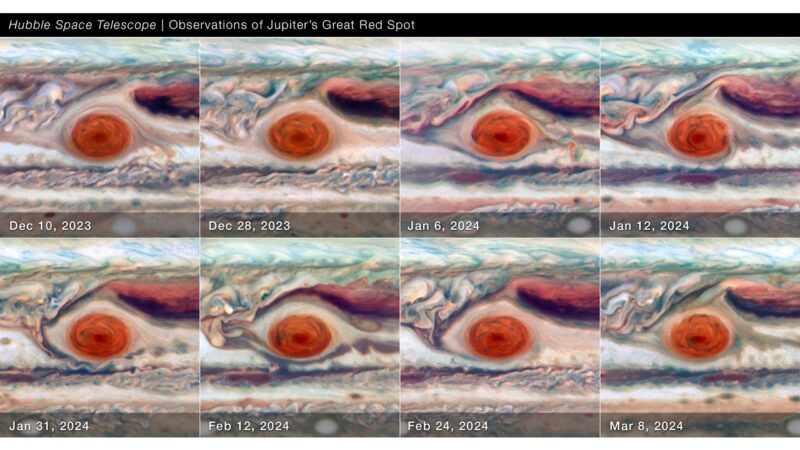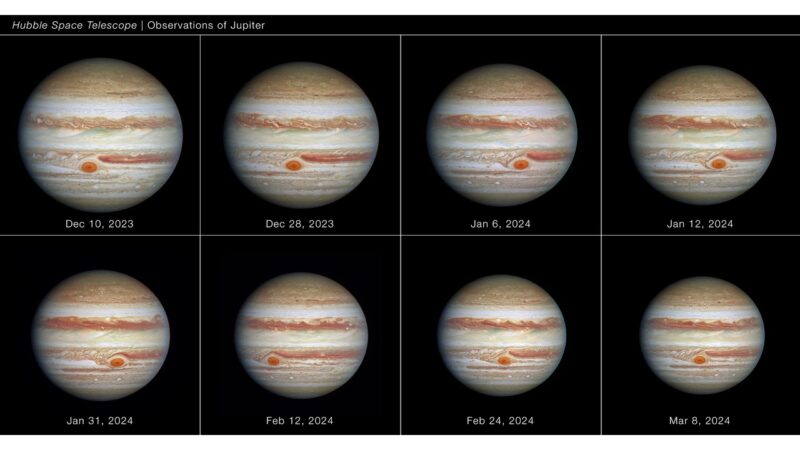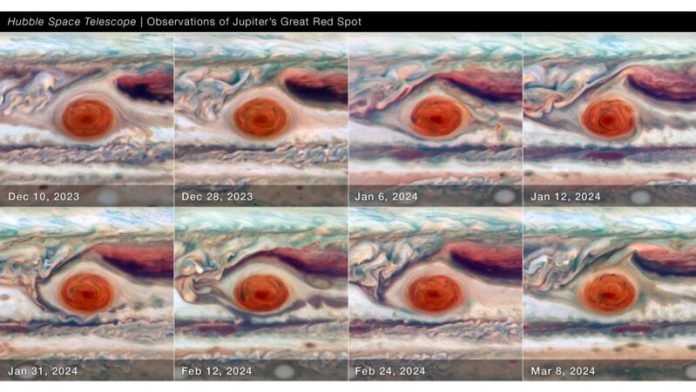- Jupiter’s Nice Purple Spot wiggles like gelatin. That’s based on scientists utilizing observations from the Hubble House Telescope.
- The enormous anticyclone has been round for no less than 150 years, however it’s not as secure because it appears.
- It’s the primary time scientists have seen the spot oscillate. The jet streams hold it in place however the storm will get squeezed like a stress ball.
NASA revealed this unique story on October 9, 2024. Edits by EarthSky.
Jupiter’s Nice Purple Spot wiggles like gelatin
Astronomers have noticed Jupiter’s legendary Nice Purple Spot, an anticyclone massive sufficient to swallow Earth, for no less than 150 years. However Hubble’s new observations of the well-known crimson storm reveal the Nice Purple Spot isn’t as secure as it would look. Current knowledge collected for 90 days from December 2023 to March 2024 present the Nice Purple Spot jiggles like a bowl of gelatin. The mixed Hubble pictures allowed astronomers to assemble a time-lapse film of the squiggly conduct of the Nice Purple Spot.
Amy Simon of NASA’s Goddard House Flight Middle in Greenbelt, Maryland, is the lead creator of the science paper revealed within the peer-reviewed The Planetary Science Journal. Simon stated:
Whereas we knew its movement varies barely in its longitude, we didn’t anticipate to see the dimensions oscillate as effectively. So far as we all know, it’s not been recognized earlier than. That is actually the primary time we’ve had the right imaging cadence of the Nice Purple Spot. With Hubble’s excessive decision we are able to say that the Nice Purple Spot is definitively squeezing out and in concurrently it strikes quicker and slower. That was very surprising, and at current there aren’t any hydrodynamic explanations.
Watch Jupiter’s Nice Purple Spot because it oscillates over time. Photos from the Hubble House Telescope between Dec 2023 and Mar 2024. pic.twitter.com/RZEzy1t8zf
— Kelly Kizer Whitt (@Astronomommy) October 10, 2024
Storms on different worlds
Hubble displays Jupiter and the opposite outer photo voltaic system planets yearly via the Outer Planet Atmospheres Legacy program (OPAL) led by Simon. However these observations had been from a program devoted to the Nice Purple Spot. Understanding the mechanisms of the biggest storms within the photo voltaic system places the speculation of hurricanes on Earth right into a broader cosmic context. This information is likely to be utilized to raised understanding the meteorology on planets round different stars.
Simon’s group used Hubble to zoom in on the Nice Purple Spot for an in depth have a look at its measurement, form, and any refined coloration adjustments. Simon stated:
After we look intently, we see a variety of issues are altering from each day.
This consists of ultraviolet-light observations displaying that the distinct core of the storm will get brightest when the Nice Purple Spot is at its largest measurement in its oscillation cycle. This means much less haze absorption within the higher ambiance.

The Nice Purple Spot is trapped between jet streams
Co-investigator Mike Wong of the College of California at Berkeley stated:
Because it accelerates and decelerates, the Nice Purple Spot is pushing towards the windy jet streams to the north and south of it. It’s much like a sandwich the place the slices of bread are compelled to bulge out when there’s an excessive amount of filling within the center.
Wong contrasted this to Neptune, the place darkish spots can drift wildly in latitude with out sturdy jet streams to carry them in place. Jupiter’s Nice Purple Spot has been held at a southern latitude, trapped between the jet streams, for the extent of Earth-bound telescopic observations.

A shrinking storm?
The group has continued watching the Nice Purple Spot shrink for the reason that OPAL program started 10 years in the past. They predict it’s going to hold shrinking earlier than taking over a secure, less-elongated, form. Simon stated:
Proper now it’s over-filling its latitude band relative to the wind area. As soon as it shrinks inside that band the winds will actually be holding it in place.
The group predicts the Nice Purple Spot will in all probability stabilize in measurement, however for now Hubble solely noticed it for one oscillation cycle.
The researchers hope that sooner or later different high-resolution pictures from Hubble may establish different Jovian parameters that point out the underlying reason behind the oscillation.
The scientists introduced their outcomes on the 56th annual assembly of the American Astronomical Society Division for Planetary Sciences, in Boise, Idaho.
Backside line: New observations with the Hubble House Telescope present that Jupiter’s Nice Purple Spot wiggles like a bowl of gelatin. It squeezes out and in like a stress ball.
Supply: A Detailed Examine of Jupiter’s Nice Purple Spot over a 90-day Oscillation Cycle
Learn extra: Jupiter’s Nice Purple Spot is 190 years outdated, scientists say
Learn extra: Jupiter’s Nice Purple Spot is shrinking! However why?

